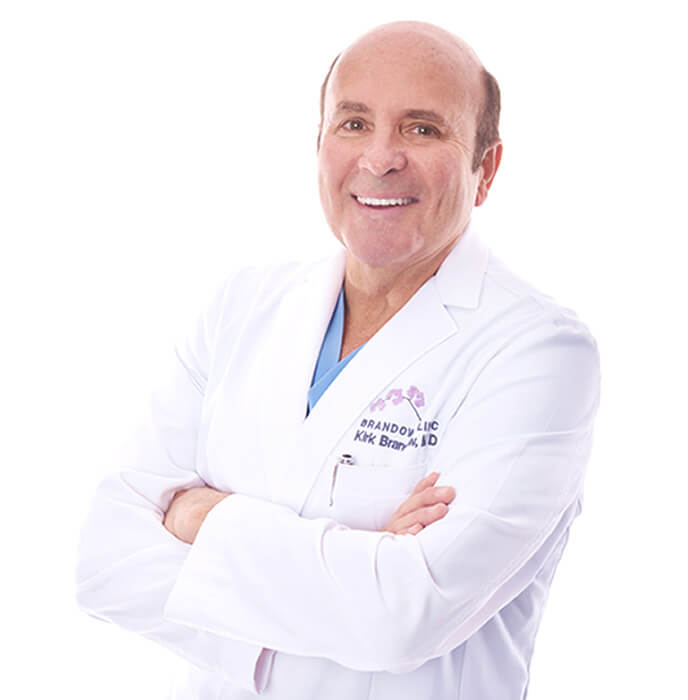When choosing to undergo plastic surgery in Philadelphia, patients seek the expertise and talent of cosmetic surgeon Dr. Kirk Brandow, MD, FAACS. Dr. Brandow specializes exclusively in plastic surgery of the face, breasts, and body. He is certified by the American Board of Cosmetic Surgery and internationally trained in plastic and cosmetic surgery. Contact us to schedule a consultation today at either of our two convenient plastic surgery locations in the Philadelphia and South Jersey areas.

Facial Plastic Surgery
Dr. Brandow offers facial plastic surgery to patients in the Philadelphia and South Jersey areas and prides himself on providing natural-looking, subtle results. Facelift surgery can smooth wrinkles and furrows around the upper, mid and lower face. Deep plane facelift surgery tightens and reshapes the underlying musculature, providing significant lifted results that are long-lasting. The short scar facelift can target the mid face for patients noticing the first signs of facial aging. Patients seeking lower facial rejuvenation can opt for a lip lift to correct lines & folds. Dr. Brandow also offers lip reduction to improve lip contours and proportions. A neck lift can also target the lower face by tightening loose neck skin and accentuating the jawline. Chin implants can bring forward a receding chin to add natural-looking definition.
Dr. Brandow can also perform eyelid surgery and a brow lift / forehead lift to target crow’s feet and wrinkles around the brows and eyelids. Fat transplant techniques are available to smooth areas of lost facial volume. Additionally, earlobe repair surgery can restore natural shape to torn or stretched earlobes.
Breast Enhancement and Augmentation
Plastic surgery can add natural-looking size and shape to the breasts using innovative breast enhancement techniques. Patients looking to increase breast size can undergo breast augmentation with breast implants. Your breast implants can be customized to best complement your body type and achieve your desired results. Dr. Brandow utilizes saline breast implants to ensure safety and efficiency when performing breast augmentation.
Breast lift surgery is another breast enhancement method that can raise the breasts and address drooping skin. Breast augmentation can combine a breast lift with breast implants to restore youthful contours to your breasts. In some cases, patients may wish to remove their breast implants or reduce their breast size. Breast reduction is also available to improve the size of overly-large breasts, enhancing proportions and relieving physical strain placed on the neck, shoulders or back.
Breast explant surgery is suitable for both cosmetic and medical reasons for removing breast implants. If you are no longer happy with the appearance of your breast implants, breast explant surgery can help restore the breasts to a natural appearance. Many patients may feel that their breast implants no longer match their physique, look proportional, or complement their figure the way they once did. Breast explant surgery can help restore the natural contours you once had.
Body Sculpting & Body Contouring
Body contouring is a form of plastic surgery in the Philadelphia area that can accentuate definition and enhance your natural musculature. Unwanted fat, love handles, bulging and drooping skin are some common cosmetic concerns that can affect self-esteem and confidence in your body. Even consistent diet and exercise may not be enough to address these conditions. Body sculpting surgery targets loose skin and stubborn fat to achieve long-lasting results.
Dr. Brandow performs liposuction to remove stubborn fat and love handles from the body. Liposuction can target troublesome areas of fat, including the neck, breasts, chest, back, arms, midsection, thighs, and legs. Tummy tuck surgery is also available for patients looking to tighten and slim the abdomen. Undergoing a tummy tuck can remove excess skin, firm lax skin and tighten loose stomach muscles that have stretched due to aging, genetics, pregnancy or substantial weight loss. Similarly, arm lift surgery can slim the arms and thigh lift surgery can re-contour the thighs. Dr. Brandow can combine body sculpting procedures to target multiple areas at once. Learn more about body contouring at our Philadelphia and Somers Point plastic surgery locations.
Non Invasive Cosmetic Procedures & Injectables
Non-invasive procedures are wonderful alternatives for patients who do not want to undergo traditional facial or body sculpting plastic surgeries. The Brandow Clinic offers non-surgical plastic surgery to enhance your complexion, add natural-looking volume and regrow areas of thinning hair with minimal downtime. The Brandow Clinic provides cosmetic injections to restore youthfulness without undergoing traditional facial surgery. Injectables are among the most popular cosmetic treatments available due to their ability to craft natural-looking results with virtually no recovery time. Dr. Brandow offers Botox Cosmetic and dermal fillers at both of our Brandow Clinic Plastic Surgery locations. Learn more about our non-invasive procedures below.
Kirk Brandow MD, FAACS
As a top plastic surgeon in Philadelphia and New Jersey, Dr. Brandow specializes exclusively in cosmetic surgery of the face, breast, and body. He is certified by the American Board of Cosmetic Surgery and is internationally trained in cosmetic surgery.
learn more about Dr. Brandow








